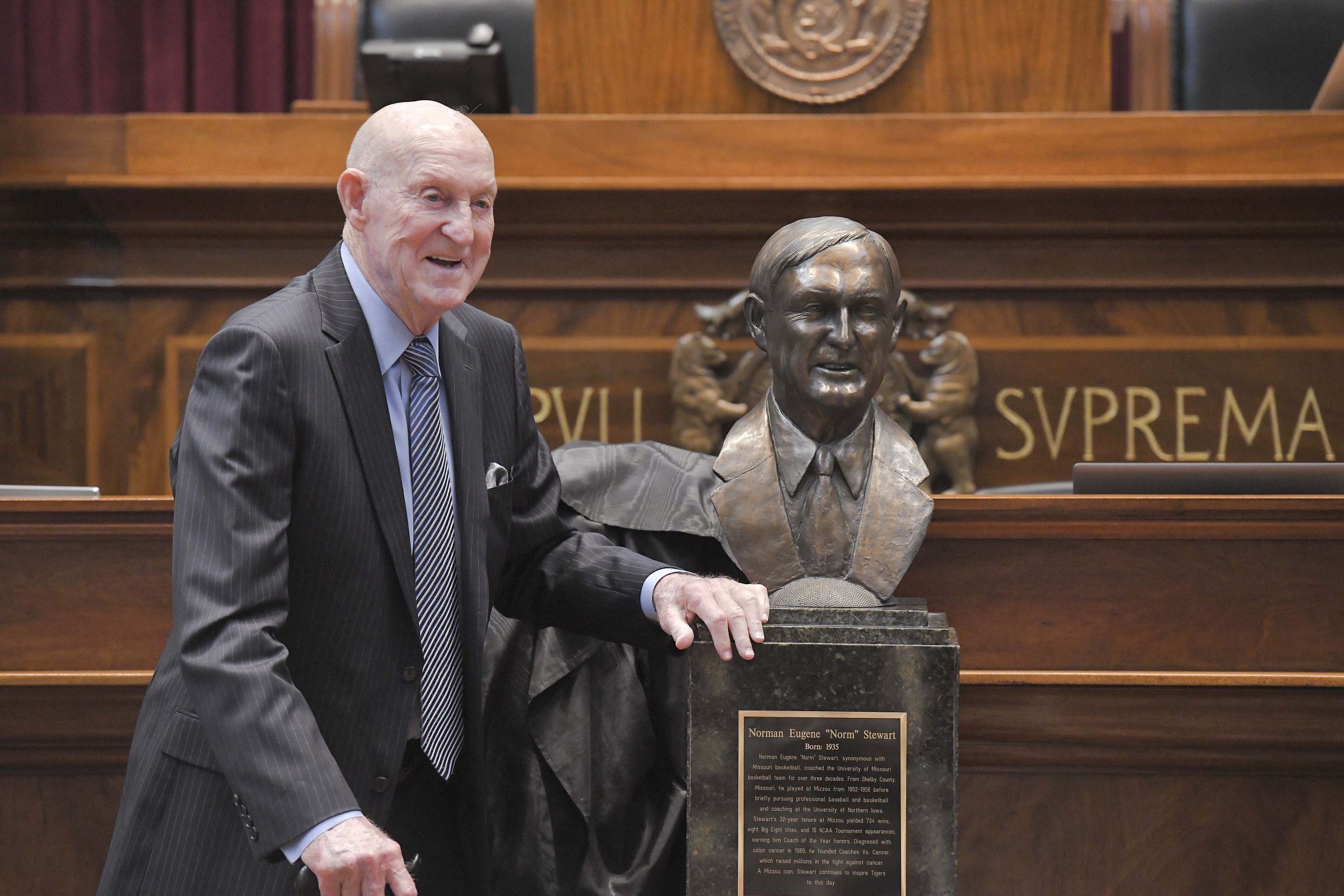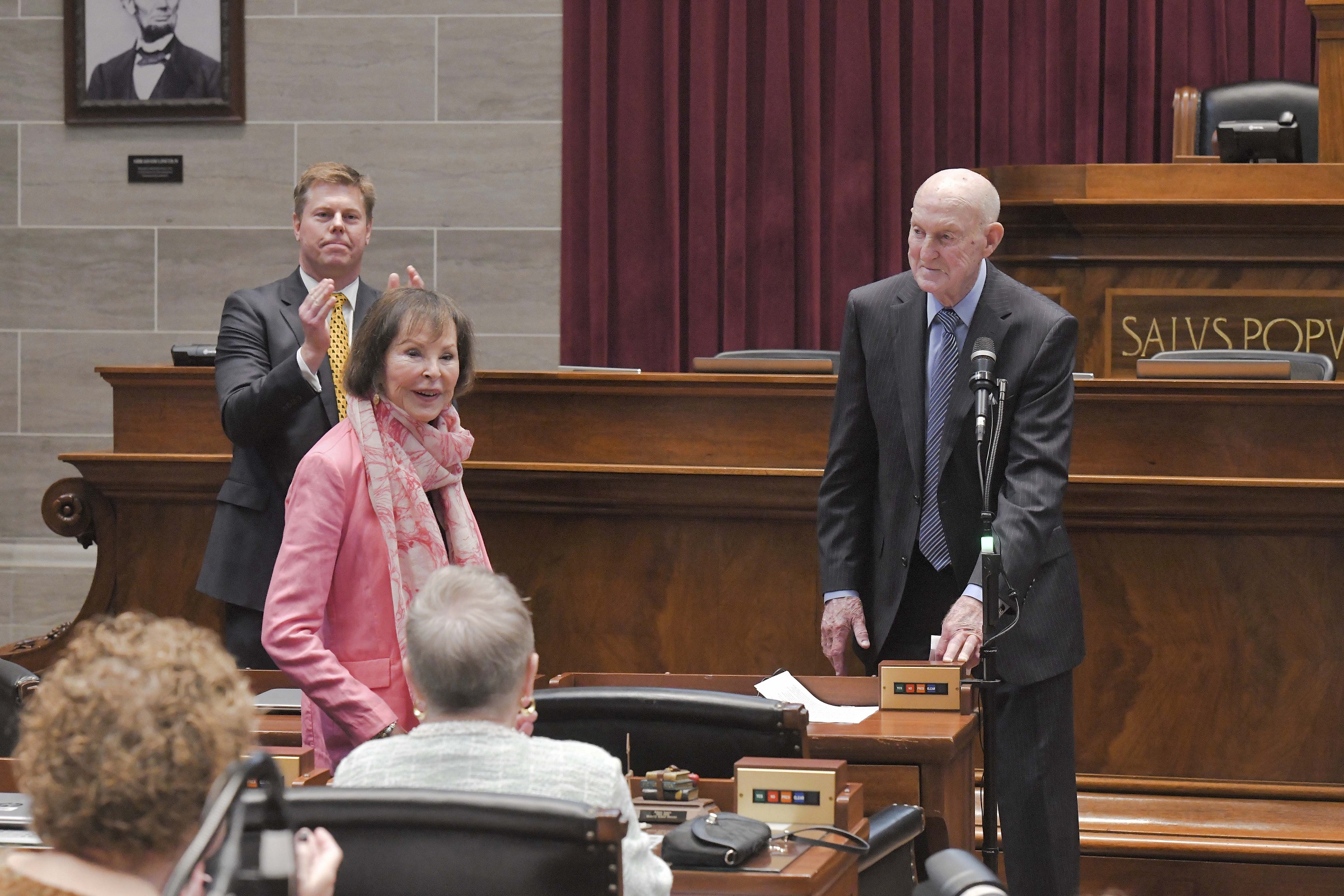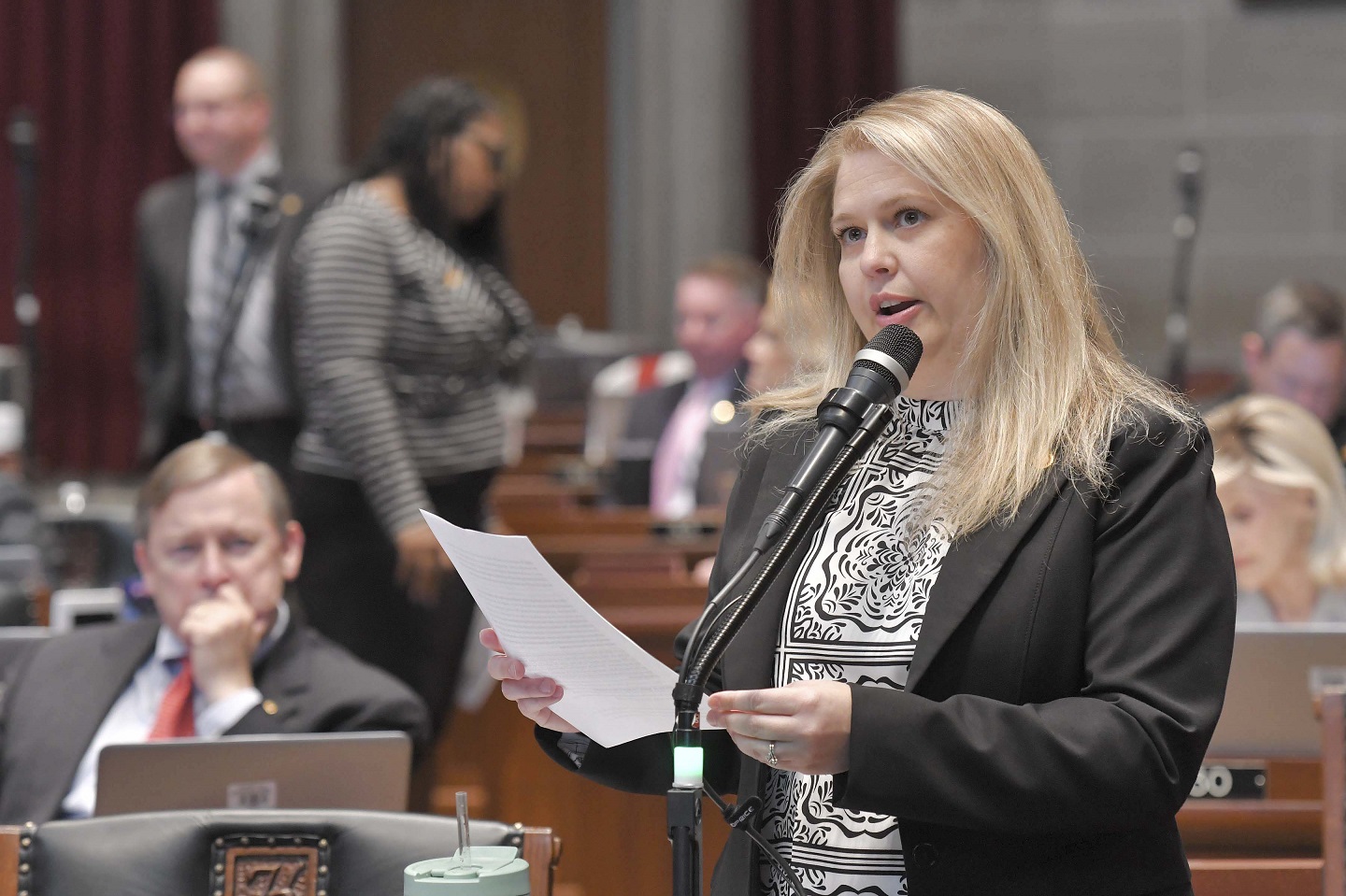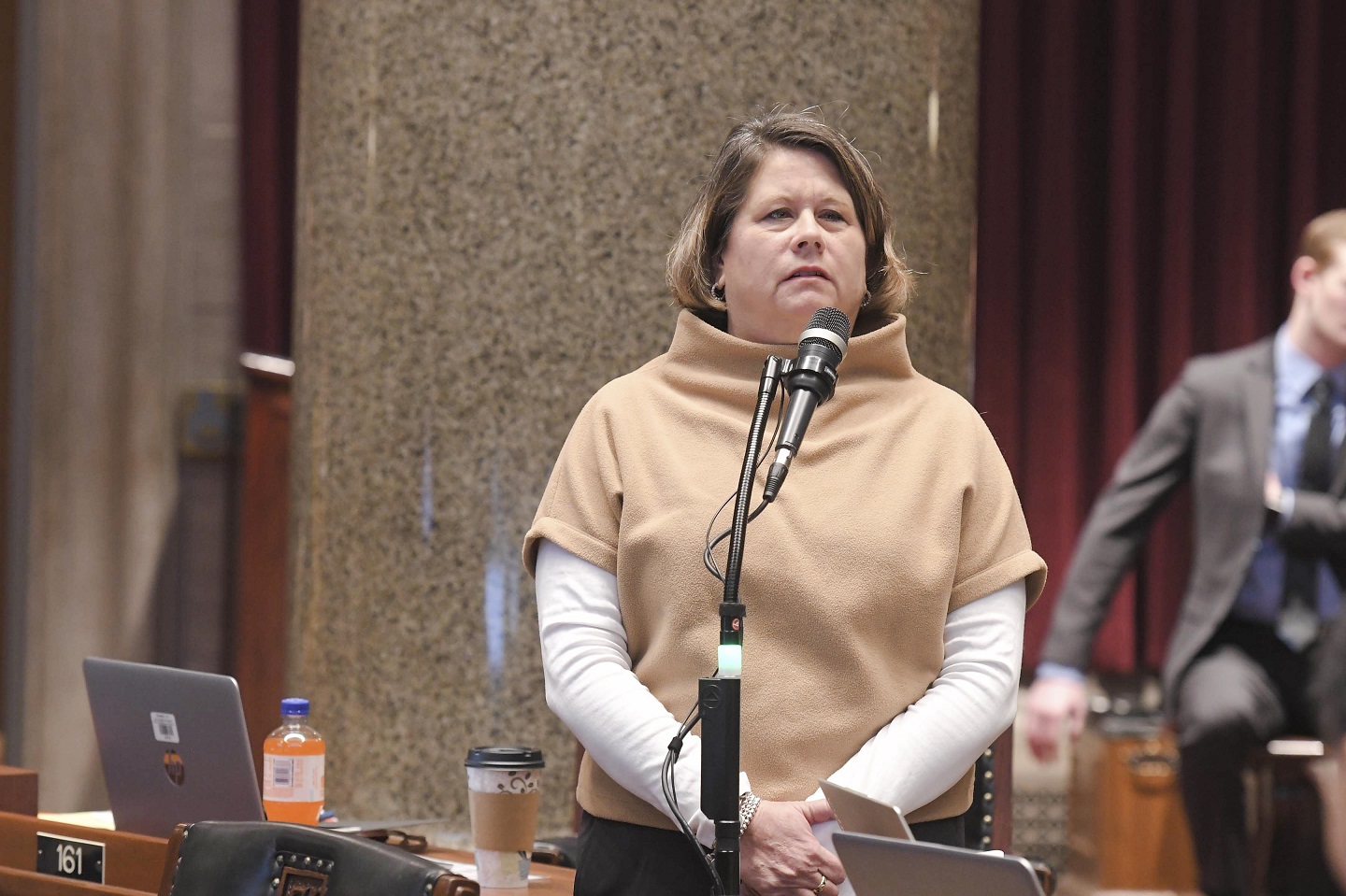House Democrats spoke to the media and took questions after the chamber ended its work for the week:
Author: Mike Lear
VIDEO: Norm Stewart Inducted into Hall of Famous Missourians
The latest inductee into the Hall of Famous Missourians is Norm Stewart, a man whose name is synonymous with Mizzou basketball.

Norman Eugene “Norm” Stewart coached the University of Missouri basketball team for over three decades. He played at Mizzou from 1952-1956 before briefly pursuing professional baseball and basketball and coaching at the University of Northern Iowa. Stewart’s 32-year tenure at Mizzou yielded 734 wins, eight Big Eight titles, and 16 NCAA Tournament appearances, earning him Coach of the Year honors.
Diagnosed with colon cancer in 1989, he founded Coaches Vs. Cancer, a renowned initiative that has raised millions of dollars in the ongoing fight against cancer. Today, Norm Stewart remains a beloved figure in the Mizzou community, his legacy serving as a constant source of inspiration for Tigers past, present, and future.
“I really am so proud to be a Missourian and to join such an illustrious class of people,” Stewart said of being inducted into the Hall. “It just makes you feel so good, it makes me feel so good … to join such an illustrious group.”
Stewart was chosen as an inductee to the Hall by House Speaker Dean Plocher (R-St. Louis), who said “Today … we celebrate more than championships and victories. We honor a man whose legacy of passion and excellence inspires us all. Norm Stewart: forever a Tiger, forever a legend.”
Stewart was born in 1935 in Leonard, Missouri, a village that at the time had fewer than 200 residents. He said he spent the first five years of his life in a one-bedroom home with three siblings before the family moved to nearby Shelbyville. They didn’t have running water until he was a sophomore in high school.

Stewart thanked and praised his family, particularly his wife.
Stewart said no matter where basketball took him, while he loved visiting other parts of the country, he was always proud to be from Missouri.
VIDEO: House Republicans urge initiative petition reform
House Republicans media conference calling for passage of initiative petition reform as the end of the 2024 session nears:
VIDEO: House Speaker Dean Plocher media conference
Missouri House Speaker Dean Plocher spoke to reporters after the House Ethics Committee voted to dismiss a complaint against him:
VIDEO: House Democrats media conference
House Democrats spoke to the media and took questions after the chamber ended its work for the week:
VIDEO: House Republican media conference
Missouri House Republicans spoke to reporters and fielded questions after the close of legislative work for the week:
VIDEO: House sends Governor a Bill to Block Landfill near Kansas City-area Neighborhoods
The state House has voted to send to the Governor a bill that would prevent the construction of a landfill in a residentially zoned area near the Kansas City border.
House Bill 1751 would require approval of nearby municipalities within a one-mile radius of a proposed solid waste processing facility, demolition landfill, or sanitary landfill, in addition to already proposed restrictions on solid waste disposal areas.
The issue has been a top priority for several years for Pleasant Hill Republican Mike Haffner, who said today’s vote is a victory for the property rights of Missourians.
“I am thrilled that HB 1751 has cleared the Missouri House and is one step closer to becoming law,” said Representative Haffner. “This legislation is a victory for the people of Missouri, who have spoken loud and clear about the need to defend their property rights and preserve the well-being of their communities.”
Majority Floor Leader Jonathan Patterson, a Lee’s Summit Republican, expressed pride in the work of Haffner and other colleagues in the House and Senate in at last guiding this issue through the legislature.
“The business owners that worked to build this landfill are decent, well-intentioned people who want to better their community and provide a service. I commend their actions to work with the community, the City of Raymore, and the legislature to come to an amicable agreement to draw this issue to a close,” Patterson said.
The House voted 121-25 to send that legislation to the governor, who can sign it into law, veto it, or allow it to become law without any action.
House Republicans’ press conference
Missouri House Republicans spoke to reporters after the close of legislative work for the week:
House Democrats’ press conference
Missouri House Democrats addressed reporters and answered their questions after the close of legislative work for the week:
House Approves Plan to Reduce Wait Times, Costs for Healthcare
House lawmakers have voted to decrease the time Missourians must wait for some medical procedures, increase quality of and access to healthcare, and decrease costs.
Insurance entities require health care providers to seek prior authorization before performing some procedures before they will agree to cover those procedures. If House Bill 1976 becomes law, health care providers who reach a 90 percent approval rate for a given procedure over a six month period will then not have to seek prior authorization for the following six months.

“Insurance companies and their prior authorization standards are getting in the way of health care for everyday Missourians,” said bill sponsor Melanie Stinnett (R-Springfield).
She said the passage of HB 1976 would mean “better access to care for patients and, potentially, decreased cost for patients, because the prior authorization process, itself, increases costs within the healthcare system.”
Stinnett said without knowing it, many patients have likely had a negative experience that involved prior authorization.
“Often, [patients] feel like it is something that the doctor hasn’t done or needs to do, but in reality it’s something that the health insurers lay over on top of what the health care provider has to do,” said Stinnett. “It’s a challenge that the health care provider has to deal with, but often the patient doesn’t realize who’s imposing it or where that’s coming from.”
“As someone who has spent hours and hours and hours trying to get preauthorization for patients that need physical therapy, I cannot support this enough,” St. Louis Representative Jo Doll (D), who has worked as a physical therapist, told her colleagues. “The process is burdensome, it takes hours and hours of – people that are there to provide patient care – takes them away from patients and makes them calling, writing, submitting countless forms to get visits approved.”

Health care industry workers and those patients who know of the prior authorization process view it as little more than “red tape” that drives up costs and slows care, and Representative Patty Lewis (D-Kansas City) agrees, and said some doctors report that the delays it causes lead to worse outcomes and even deaths.
The legislation made its way to the House after being approved by the Committee on Healthcare Reform. Chairman Kent Haden (R-Mexico) noted that panel gave it a bipartisan, unanimous vote.
“The only people that testified against it were the insurance people and [pharmacy benefit managers],” Haden said. “It is really good for all of our clients, all of our constituents. Not many bills we see effect everybody in the House and all their constituents. This bill will effect virtually everyone and their constituents immediately. It’s a great bill.”
Stinnett told her fellows the prior authorization process gives power to insurance companies and leaves providers fighting to get the best care and outcomes for their patients. Her legislation aims to change that, and to allow providers to focus more on patients’ needs rather than what insurers will allow.
The House voted 146-6 to send that legislation to the Senate.